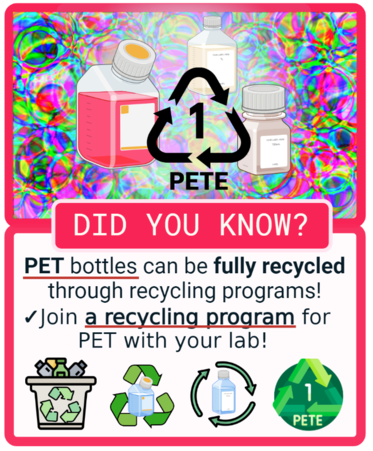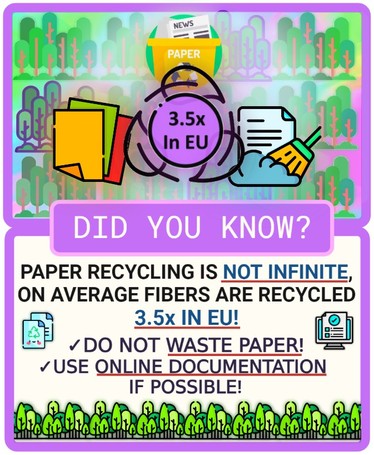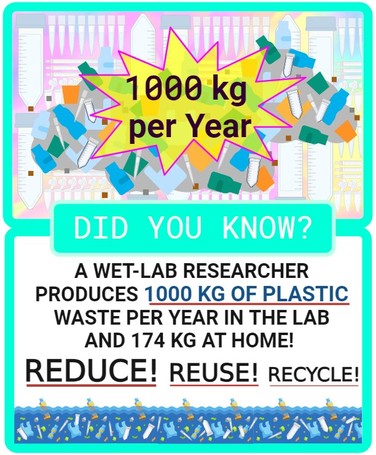Green Facts - Waste
PET recycling
March 2023
 The facts
The facts
Polyethylene terephthalate (PET/PETE; polymer code 01) is a common material used for household (water bottles, sleeping bags… etc.) and laboratory products (e.g., cell culture bottles and packaging) due to the fact that the plastic is lightweight, resilient and transparent. In response to the increasing global plastic consumption, numerous PET recycling programs have been established, such as the Cell culture for future PET recycling program at PAN-Biotech. And the good news is: It is possible to fully recycle PET plastics. In other words, used PET plastics can be melted to produce new PET products with high quality. However, it is essential that the input material is pure and therefore appropriate separation is required.
What we can do
- Join a recycling program for PET with you lab!
- At the BMC, PAN-Biotech’s Cell culture for future program has been established with support of LMU's Occupational Safety and Sustainability Unit.
- Get collection bag and box from BMC waste instructors.
- Rinse, dry and collect your empty PET bottles (not only from PAN-Biotech). Currently, no other PET products (e.g. packaging) are collected.
- Arrange with facility management BLUNCK for pick-up.
References
1. PET can be fully recycled: Deutsche Landwirtschafts-Gesellschaft, 2016
2. Example for PET recycling program: Cell culture for future PET recycling program by PAN-Biotech
3. Some examples of collected PET bottles at the BMC
Created with BioRender.com
Further icons:
Recycle icons created by surang - Flaticon; Recycle bottle icons created by IconsNova - Flaticon; Plastic recycling icons created by Freepik - Flaticon
Download poster (800 KByte)
Paper recycling
September 2023
 The facts
The facts
Germany consumes around 19 million tons of paper, cardboard and carton every year. In most cases, the paper ends up in the trash after a single use. Paper production places a heavy burden on the climate and damages the forest globally. Although paper fibers can be recycled several times, this is not possible indefinitely; therefore, the recovered fibers must be combined with new pulp. In 2021 in Europe, paper fibers were recycled on average only 3.5 times and 19% of paper was not recyclable or collectable, according to the European Paper Recycling Council (ERPC).
What we can do
- Golden rule of saving paper: Think twice if you really need to print.
- Go digital – read, send & store digital documents instead of printing them.
- If printing is needed, print on both sides (duplex) and/or multiple pages on one sheet.
- Use paper made out of recycled fibers.
- Reuse old printouts as scratch paper.
References
1. Paper use in Germany
2. European Declaration on Paper Recycling 2021-2030 - Monitoring report 2021 (PDF)
3. Recycling of paper - Information by European Paper Recycling Council
4. How to reduce paper consumption in your office - World Wide Fund For Nature (PDF)
Created with Biorender.com
Further icons: Paper icons created by Freepik - Flaticon; Data cleaning icons created by Freepik - Flaticon; Recycle icons created by Vectors Tank - Flaticon; 7 days icons created by Freepik - Flaticon; Forest icons created by prettycons - Flaticon; Document icons created by justicon - Flaticon; Forest icons created by Freepik - Flatico
Download poster (455 KByte)
Plastic waste
November 2023
 The facts
The facts
A study reports that 280 bench scientist of a bioscience department of the University of Exeter, England, produced about 267 tonnes of plastic waste in 2014. That is equivalent to 5.7 million 2L plastic bottles.1 Sustainable/recycled single use plastic for the lab is still substantially more expensive than conventional single use plastic and will ultimately generate waste which will often not be recycled again.
What we can do
- Many of us strive to reduce, reuse and recycle waste at home. Let's do the same in the lab.
- Reduce: plan and execute your experiments in order to reduce plastic waste. Order preferably from companies using sustainable packaging.
- Reuse: wash or rinse and reuse plastic containers when possible.
- Recycle: collect non-contaminated plastic (e.g., PET bottles).
References
1. Plastic waste in labs (Mauricio et al, Nature, 2015)
2. Plastic waste in Europe
3. Reduce, reuse and recycle lab waste (Bistulfi, Nature, 2013)
Created with Biorender.com
Further icons: Waste icons created by photo3idea_studio - Flaticon; Waste icons created by photo3idea_studio - Flaticon; Plastic icons created by wanicon - Flaticon
Download poster (400 KByte)

